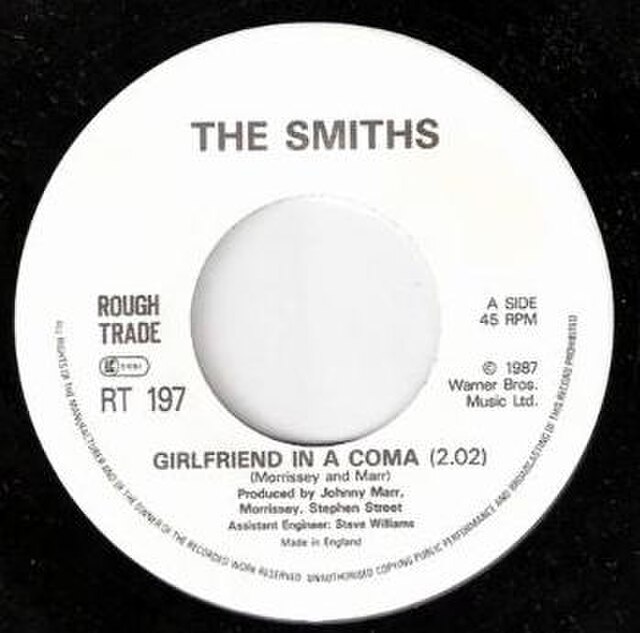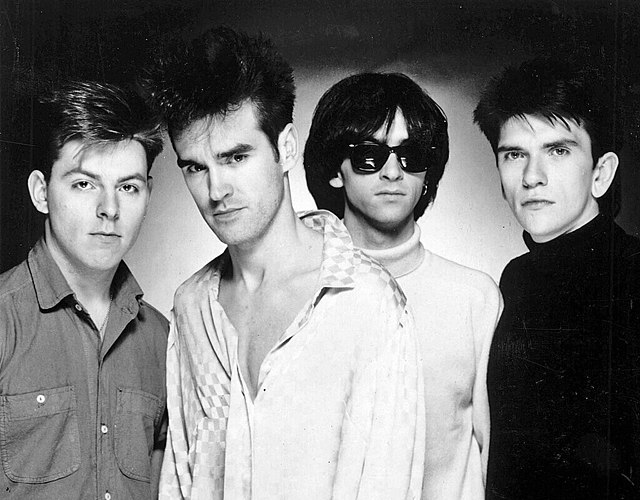ARTIST REVIEW: The Smiths: Deep diving into the band’s complicated lore
A band that sent ripples through the post-punk and indie rock genre of the 1980s; The Smiths are undeniably masters at their craft despite their various controversies.
For this week, I have decided to – once again – try something slightly different. I usually cover artists that I am a fan of, or at least familiar with. In this case, I wanted to talk about a band that I just recently got into, despite having been around for quite a while. It had been recommended to me for years now, and I always noticed how popular they seemed to be in the goth and alternative subcultures. I finally gave in about two weeks ago, and ever since then, I’ve been hooked. So, I am happy to learn alongside you all as I write this piece centered around The Smiths.
Debuting in 1982, The Smiths were composed of four members: lead singer Morrissey, guitarist Johnny Marr, drummer Mike Joyce and bassist Andy Rourke. This group of musical misfits made a statement from their very first album, naming it after the band itself. That same year, the album reached number two in the UK albums chart, an instant success. Fans were attracted to Morrissey’s gentle yet haunting vocals. Despite being branded by the media as an indie rock band, the band considered itself an antithesis compared to the rock of the era.
While most rock in the 80s went for heavier, gritty sounds and often showed hyper-masculine imagery, The Smiths opted for a softer, clean, and genderless look. They did not care for the over-the-top bravado or machismo that was so often seen in the rock scene at the time. But rather they gave birth to a completely new sound, opening many doors for future bands to come. Specifically, the band’s most accurate genre descriptor is post-punk, which usually consists of melancholic lyricism accompanied by layered acoustics. Vocals almost always have an ethereal trait to them, with plenty of echo and reverb.
The difference between other post-punk bands at the time and The Smiths though was the fact that they were not afraid to embrace the softness. The best way to describe it is that it’s music you’d want to sway to, not particularly dance to. A unique sound even in the post-punk scene, the sound was the complete opposite of the lyrical content.
The Smiths caused much controversy during their reigning years. Some of the most well-known controversies are due to the content matter of their lyrics, but more accurately, their sky-rocketing success as an alternative rock band shook the mainstream world that was so accustomed to disco pop. There was also quite a lot of controversies involving the lead singer, Morrissey, and his overall attitude. This led to many tabloids spreading misinformation about songs while also criticizing Morrissey for certain actions. Some of the songs that caused uproar were “Reel Around the Fountain,” “Handsome Devil” and “The Hand That Rocks the Cradle.” All three were accused of being songs that referred to pedophilia, but this was openly addressed by the band and strongly denied.

As for Morrissey, he was known for supporting far-right political ideologies, though during the beginning of the band’s success this wasn’t as prevalent. He has proven otherwise in recent years, to the point that he is quite hated in the post-punk and indie rock communities, making racist comments, while also becoming an extreme vegan. He named a whole album “Meat is Murder” to protest the meat industry. Being vegan is not a problem, it’s his actions that were. He once canceled a concert simply because there were hot dog street vendors outside the venue. He’s a fascist and a racist, as he seemed to care more about animals’ lives than the lives of immigrants and POC. We don’t support that.
It was rumored that because of Morrissey’s attitude, he constantly clashed with his bandmates. This – alongside some financial and managerial issues — eventually led to the band’s breakup in 1987, only five years after their debut. This short-lived success was killed by off by a messy breakup that led all members to agree that they’d never get back together, and publicly stating that they were no longer friends.
Despite the awful taste in my mouth that Morrissey left after I continued to research the band, I have to admit that this is an instance where we must separate the art from the artist. As a collective and not singular project, it’s safe to say that the music can still be enjoyed. It’s also comforting to know that one of the key factors that makes The Smiths so great – the instrumentals – did not actually involve Morrisey as much. In fact, the primary songwriter for most of The Smiths’ songs was Johnny Marr. An unproblematic and seemingly cool dude. Fans themselves often point out how Morrissey is a horrible person, and that even though they love the band, they don’t love him.
Coming into this as a new fan, I have to say that it was a lot to take in. But it doesn’t take away my enjoyment for the music they produced during their peak years. It really is unlike any other sound I’ve heard, even though I listen to post-punk quite often. My recommendations for any curious music fans out there are “Heaven Knows I’m Miserable Now”, “Please, Please, Let Me Get What I Want”, “Last Night I Dreamt That Somebody Loved Me”, “I Know It’s Over”, “Hand in Glove”, and their most well-known hit, “There is a Light That Never Goes Out”. The Smiths’ entire discography is out on all music streaming platforms. Check them out if you think their sound might suit your tastes. And if you become a new fan like me, let’s collectively agree to not acknowledge Morrissey’s nasty presence.



